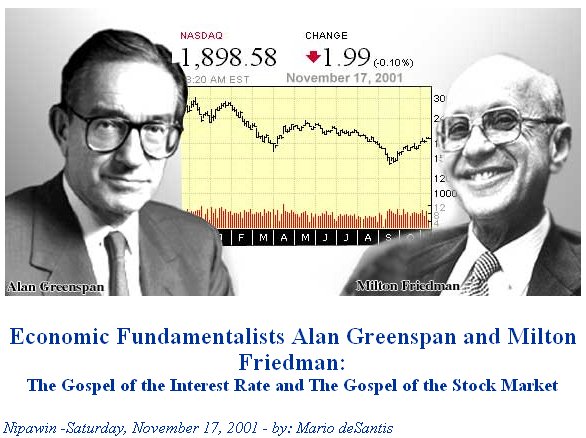Learning Stories
by
Mario deSantis
mariodesantis@hotmail.com
“I am a Canadian, free to speak without fear, free to worship in my own way, free to stand for what I think right, free to oppose what I believe wrong, and free to choose those who shall govern my country.” - -The Rt. Hon. John Diefenbaker, Canadian Bill of Rights, 1960
“The whole judicial system is at issue, it's worth more than one person.”--Serge Kujawa, Saskatchewan Crown Prosecutor, 1991
“The system is not more worth than one person's rights.”--Mario deSantis, 2002
Ensign Stories © Mario deSantis and Ensign
|
|
Our neoclassical economists supporting privatization, phony governmental downsizing, and liberalization of markets are in one sense fundamentalist economic preachers metaphorically comparable to the fundamentalism found in the version of Christianity preached by reverends Jerry Falwel and Pat Robertson and in the version of Islam preached by the Taliban. We have the individual responsibilities to be participative citizens and therefore we must create our own realities through our own experiences and reflections. As a consequence, we must never become brainwashed by the fundamentalist preachers we find in the media, in politics, in religion and everywhere else because of today's consumerism thrown into our brains by our suppliers of goods and services: the Big Corporations. Nobel Laureate Milton Friedman and US Federal Reserve Board chairman Alan Greespan have been the economists preaching the gospel of monetary policies to run our economies for the benefits of the 'few and privileged.' In particular, they have been hailing the institution of the stock market as representative of our well-being and as a consequence they have been selling the gospel of changing the central banks' interest rates to prop up the stock market. We are being brainwashed little by little and we have become now incapacitated to think for ourselves. The war against terrorism has diverted our attention to our basic needs of individual freedom, while our media is telling us about the performance of the stock market every minute of the day! It is time to wake up and think for ourselves. We need to change our financial institutions for the better, and we must break down this obsession with the stock market performance as a proxy for our own well being. And we must learn to become less selfish in our economic life so that we can balance our individual well-being with the well-being of others as well. In order to break down the myth that the stock market is the true proxy for our social well-being I am going to refer to the following explanations provided by US economist Dean Baker and I urge the readers to challenge and reflect on these explanations: ***At its peak in the first quarter of 2001, the ratio of the price of all corporate equities to after-tax corporate profits was over 31 to 1. This is more than twice the historic average of less than 15 to 1... This bubble implied more than $9 trillion in illusory wealth compared to a situation in which price-to-earnings ratios were near their historic levels... ***It is not possible for the stock market to consistently rise more rapidly than the growth rate of corporate profits... ***Stock holdings are heavily concentrated among the nation's richest families. The richest one percent own nearly 50 percent of stock shares and the richest 10 percent own more than 80 percent of individually held shares. When the Federal Reserve Board makes a decision to prop up the market, it is making a decision to transfer wealth from the rest of the nation to a minority of rich people... ***The value of individual stock holdings are, in effect, claims against the nation's wealth. The greater the value of these holdings, the larger the portion of the nation's wealth is controlled by those who have stock holdings. The concrete manifestations of this wealth are felt most immediately in the prices of goods that are in relatively fixed supply: most obviously, housing. Tens of millions of families are paying more for homes or rent because the stock market has given a small segment of the population more money to bid up home prices... References Mario deSantis coined the term 'few and privileged' while analyzing the double talking of the Government of Saskatchewan run by former Premier Roy Romanow THE NEW ECONOMY GOES BUST: WHAT THE RECORD SHOWS, by Dean Baker, October 29, 2001 http://www.cepr.net/new_economy_goes_bust.htm AN END TO SELF-DEFEATING RHETORIC, by Dean Baker, co-director of the Center for Economic and Policy Research. http://www.tompaine.com/opinion/2001/07/10/2.html |
